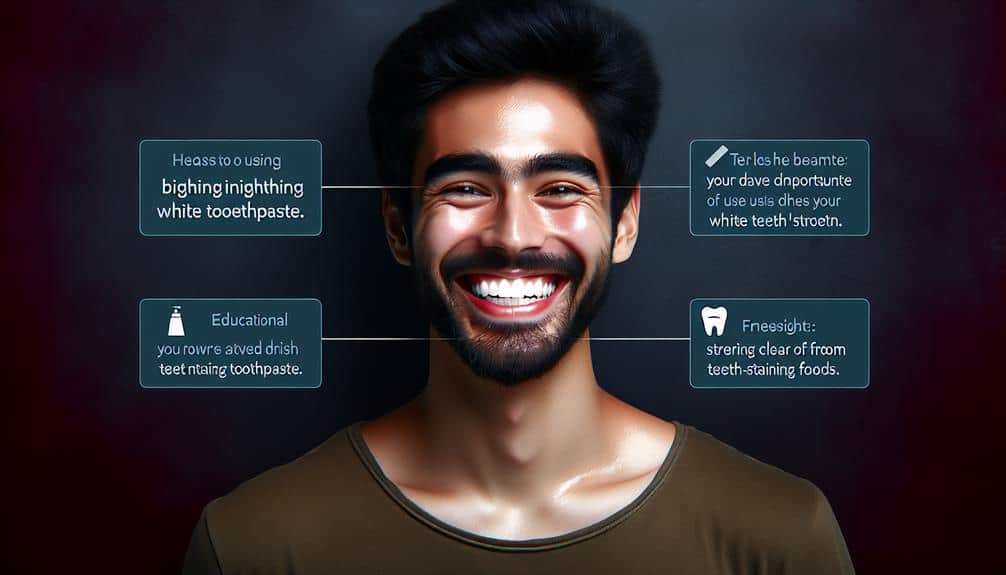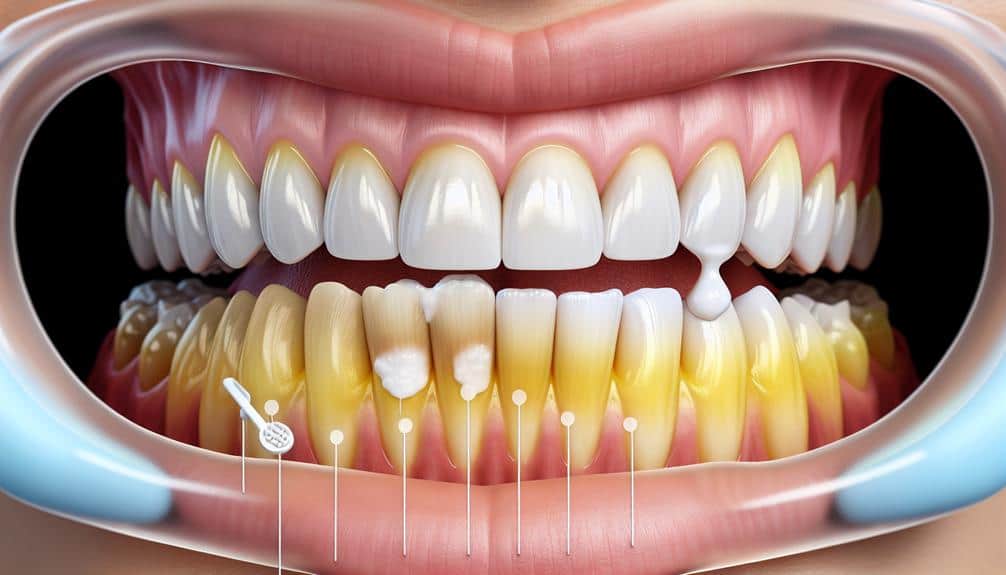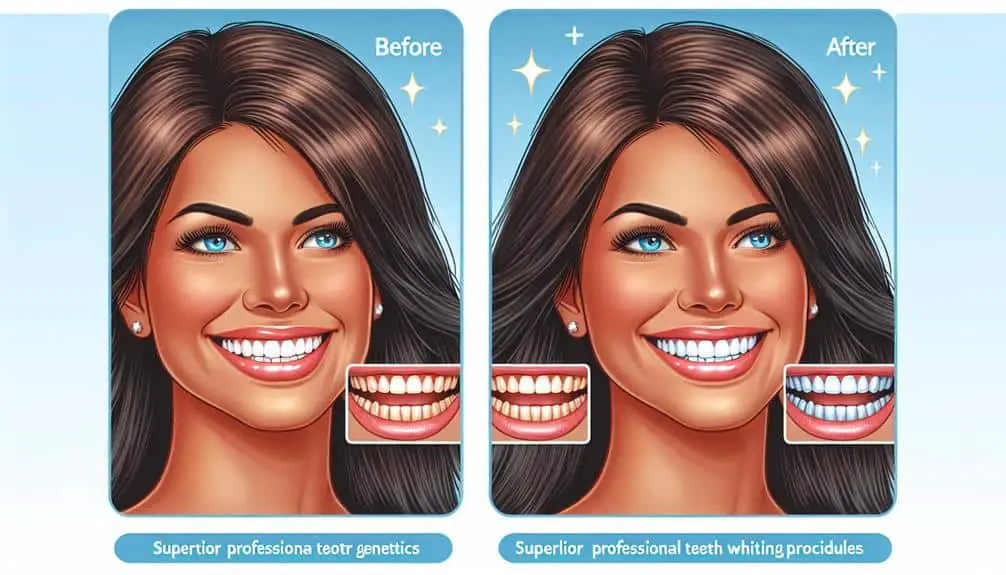For genetic tooth discoloration, consider these top treatments: Professional whitening offers effective results through in-office bleaching or take-home kits tailored to your needs. In-office dental procedures like laser treatment, enamel microabrasion, and composite bonding can enhance your smile significantly. At-home options include over-the-counter whitening strips, whitening toothpaste, custom trays with bleaching gel, or natural remedies like baking soda. Remember to follow instructions to protect your teeth and gums. These solutions, guided by dental professionals, can help address genetic tooth discoloration effectively.
Key Points
- Consult with a dentist for tailored treatment recommendations.
- In-office bleaching with high-concentration gel for deep stains.
- Laser treatment targets pigmentation effectively.
- Customized at-home kits with bleaching gel for convenience.
- Professional whitening and composite bonding offer significant improvement.
Professional Whitening Options
When considering professional whitening options for genetic tooth discoloration, consult with a qualified dentist to determine the most effective treatment plan for your specific needs. Cosmetic dentistry offers various professional whitening solutions that are safe and efficient. Dental professionals can assess the severity of your discoloration and recommend the best course of action.
One common professional whitening option is in-office bleaching, where a high-concentration bleaching gel is applied to the teeth and activated with a special light. This method provides quick and noticeable results, making it a popular choice among patients seeking immediate improvement in tooth color.
Another option is take-home whitening kits prescribed by dental professionals. These kits consist of custom-made trays and professional-grade bleaching gel, allowing you to whiten your teeth at your convenience. While this method may take longer to show results compared to in-office treatments, it's effective and more cost-efficient in the long run. Consulting with a dental professional will help determine the most suitable professional whitening option for your genetic tooth discoloration.
In-Office Dental Procedures
For genetic tooth discoloration, in-office dental procedures offer advanced solutions tailored to provide effective and lasting results under the expertise of trained professionals. These procedures utilize cutting-edge techniques to address the specific needs of genetic tooth discoloration, ensuring a customized approach for each individual.
Here are some key in-office dental procedures for genetic tooth discoloration:
- Laser Treatment: Utilizing laser technology, this procedure targets and breaks down pigmentation in the teeth, effectively lightening and brightening the enamel.
- Enamel Microabrasion: This technique involves gently removing surface stains and discoloration from the enamel, revealing a whiter and healthier-looking tooth surface.
- Professional Whitening: In-office professional whitening treatments are highly effective in combating genetic tooth discoloration, providing significant improvement in tooth color in just one session.
- Composite Bonding: This procedure involves applying a tooth-colored resin material to the teeth, correcting discoloration and enhancing the overall appearance of the smile.
At-Home Whitening Products
Explore an array of at-home whitening products that can complement and extend the results of in-office dental procedures for genetic tooth discoloration. DIY remedies and natural solutions offer a convenient way to maintain and enhance the whiteness of your teeth between professional treatments.
Over-the-counter whitening strips are a popular choice for at-home use. These strips are coated with a bleaching agent and are designed to be applied directly to the teeth. Whitening toothpaste containing mild abrasives and polishing agents can also help remove surface stains and lighten tooth color over time.
Another option is whitening trays that can be filled with a bleaching gel and worn for a specified period. These trays provide a more customized approach to at-home whitening. Additionally, natural remedies like baking soda and hydrogen peroxide mixtures can act as gentle whitening agents when used cautiously.
When using at-home whitening products, it's essential to follow the instructions carefully to avoid damaging the teeth or gums. Consult with your dentist to determine the best at-home whitening option for your genetic tooth discoloration.
Frequently Asked Questions
Are There Any Natural Remedies or Alternative Treatments Available for Genetic Tooth Discoloration?
For genetic tooth discoloration, explore herbal remedies and home remedies. Natural solutions like oil pulling or baking soda can help. Consider alternative therapies like activated charcoal. Consult a dentist for guidance on these options.
Can Genetic Tooth Discoloration Be Prevented in Future Generations Through Genetic Testing or Counseling?
In the domain of genetic counseling, the focus shifts towards prevention. Future generations benefit from testing, paving the way for informed decisions. Genetic testing and counseling become pivotal tools in steering the course of health outcomes.
How Long Do the Results of Professional Whitening Options Typically Last for Genetic Tooth Discoloration?
To maintain professional whitening results for genetic tooth discoloration long-term, consider at-home options like whitening products. Periodic professional touch-ups can help sustain brightness. Results' longevity varies, but diligent care and regular maintenance can prolong effects.
Are There Any Dietary or Lifestyle Changes That Can Help Maintain the Results of In-Office Dental Procedures for Genetic Tooth Discoloration?
Want to maintain that bright smile post-treatment? Make simple tweaks! Opt for teeth-friendly foods, limit staining culprits like coffee, and embrace natural remedies like oil pulling. Small changes, big impact on genetic tooth discoloration longevity!
Can Genetic Tooth Discoloration Be a Sign of Underlying Health Issues That Should Be Addressed by a Medical Professional?
Genetic tooth discoloration can indicate underlying health issues requiring medical attention. Your dentist can assess if there are systemic concerns. Treatments vary based on the cause. Proper diagnosis is essential for effective treatment.



